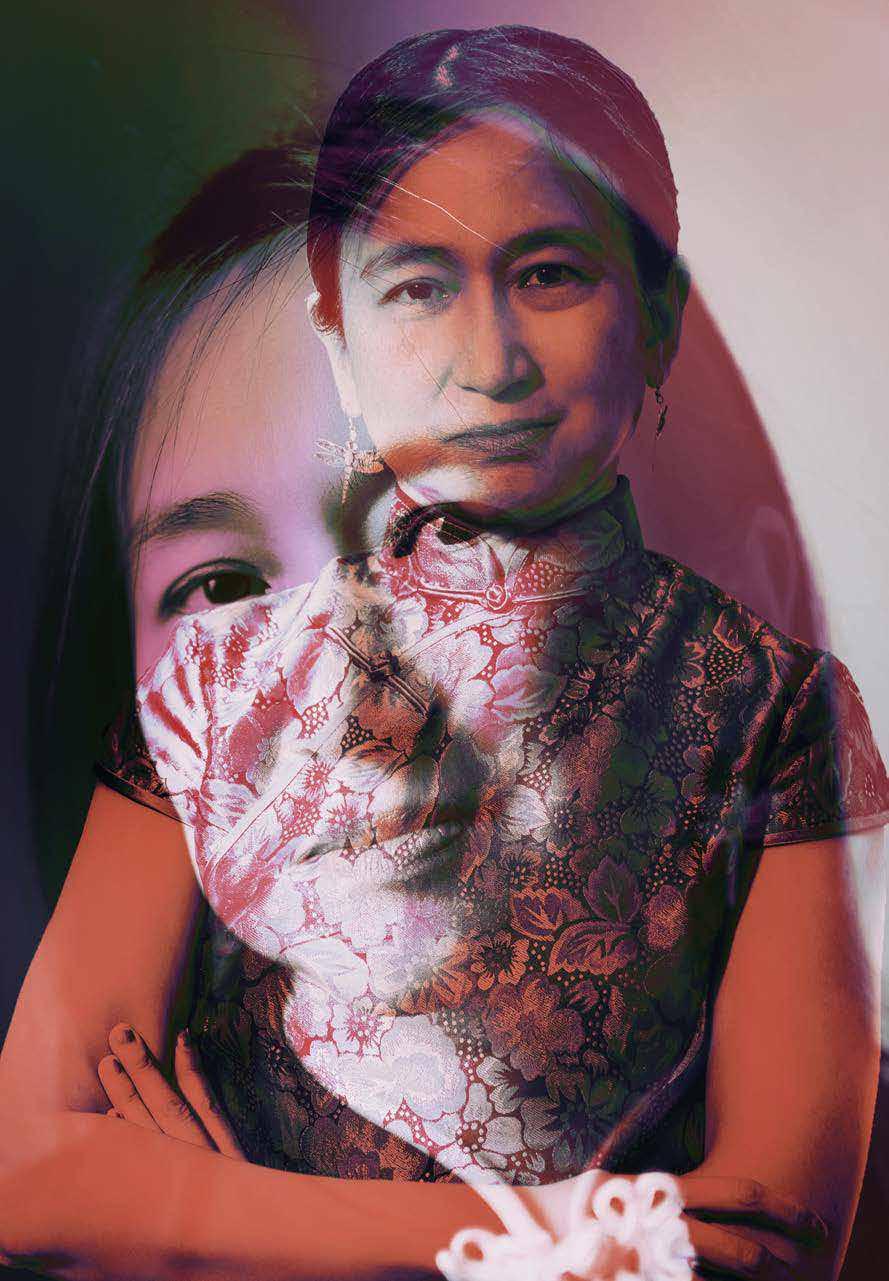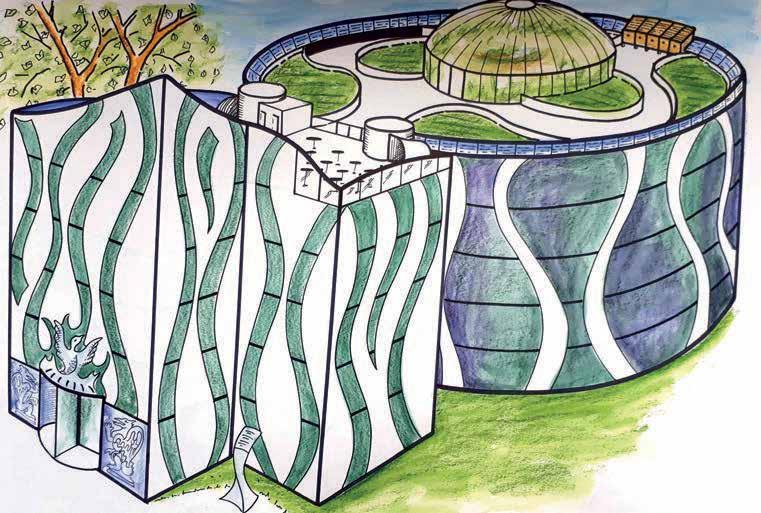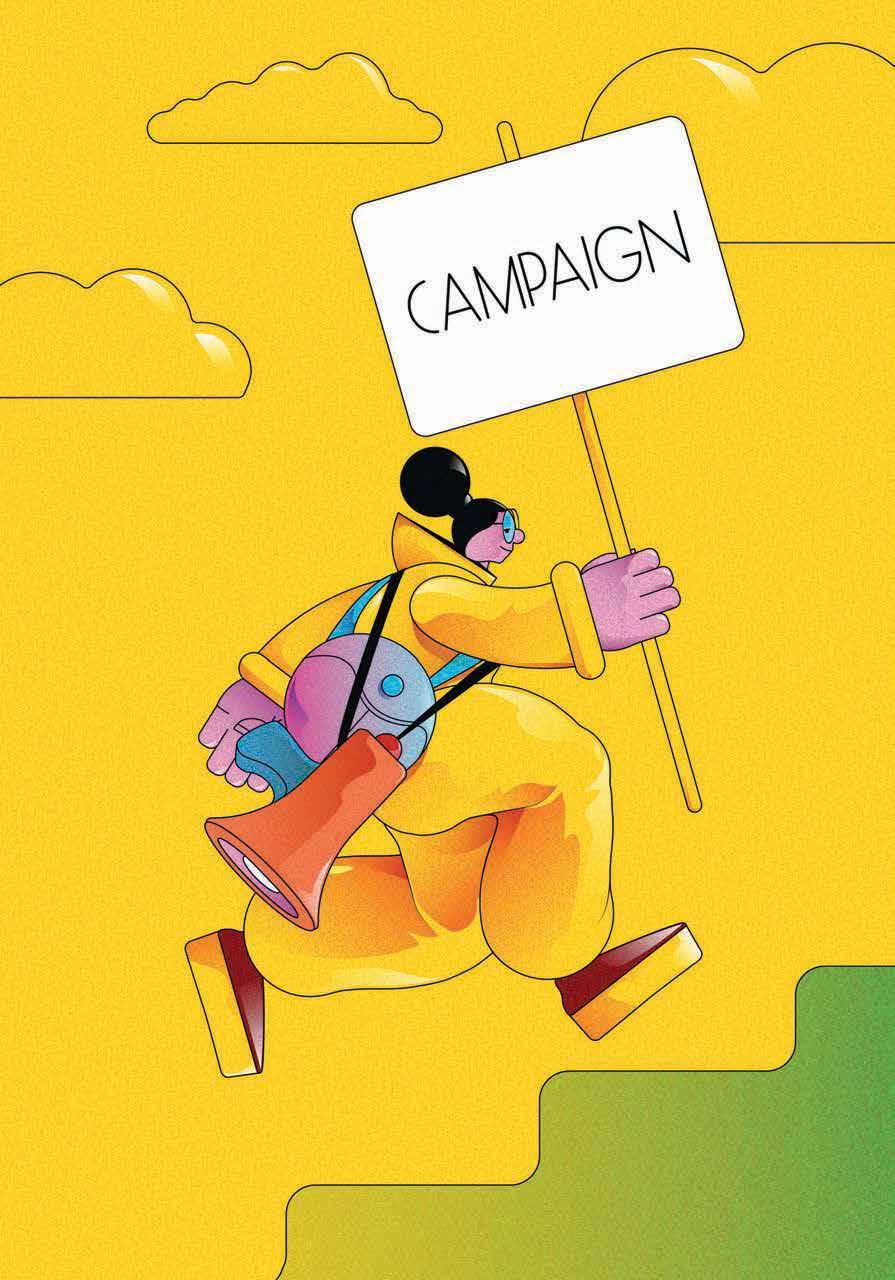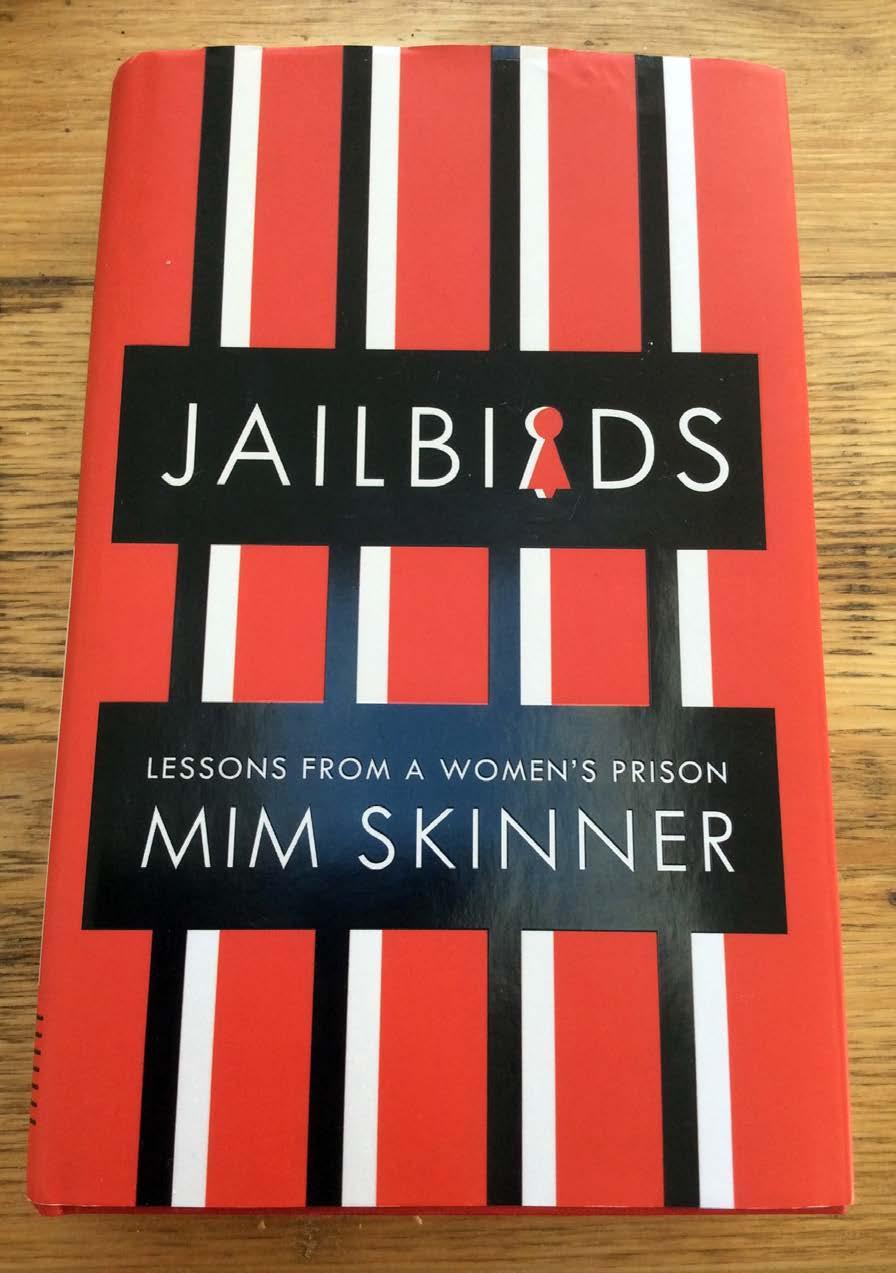
16 minute read
M a i n F e a t u r e s
MEET THE WOM EN SPEAKING OUT ABOUT THE IR Laura Hill, WIP’s Press and Communications Officer, interviews three women who met their MPs (the people who represent them OF PRIS ON in parliament) at the #OPENUP just wake up on the morning of my crime and think I’m Women’s Futures Mass Lobby. going to commit my crime without considering my children. I was poorly, I had mental health issues and I had a massive family breakdown. When I got to LOUISE'S breaking point, the support services weren’t there and I ended up in custody.” I told him some of the nicest people I’ve met have killed someone and Philip said “What?”. I spoke about STORY how I knew a lady who killed her husband after years of abuse; she had nowhere to turn and just snapped. I said it doesn’t make it right to kill someone, but you need to
How did you feel on the way to the lobby? look at the circumstances which led to it.
Advertisement
I was a bit nervous, as this was my first time in London. Also I was worried about meeting MPs. What advice would you give to others wanting to lobby their MPs? I felt a bit nervous about meeting with the MPs, but I
Who did you meet with? thought MPs are no better than we are; they are just
I was told before I met Philip Davies MP that he was a human beings and they are certainly nothing to be hard nut to crack, but he was really interested in what I scared about. Once I started talking, I was alright, and had to say. He asked lots of questions and wanted to my nerves disappeared. know about my experience of prison. He also wanted My advice is MPs are just people, so be honest, just to visit a Women’s Centre to see what can be done with be yourself and if they don’t want to listen, it is their more funding. loss. All you can do is be true to yourself.
The other MP I met was smiling but I felt like she was not really listening; she seemed like she had no interest in the issue and there were more important things to be fighting for. What did you enjoy most about the day? The food was fantastic; it was nice to meet everyone from Women in Prison and it was nice to spend the day with Narinder [from Women in Prison] because she has
What did you speak about? been such a good support whilst in and outside of prison.
I spoke about how the money from the sale of Holloway Prison should be used to fund Women’s Centres and women's support services. I also spoke to Philip about how prison devastates What did you enjoy least? The London Underground, it’s horrific – the heat is the worst feeling in the world. children and families. I used myself as an example. I What was the most important message said “don’t look at every mum who commits a crime as you took away from the day? being a terrible mum and that it is her fault that she is Women together are empowered; women do matter and in prison. There’s a lot that builds up to that. I didn’t we can speak up. We have a voice! Illustrations by PPaint 18
MEET THE WOM EN SPEAKING OUT ABOUT THE IR EXPERIENCE OF PRIS ON TO MPs
IMANI'S STORY
How did you feel on the way to the lobby?
I was a bit nervous when I got to Parliament. I was worried I might be intimidated by the MPs and that my point of view wouldn’t be heard.
What was the key point you wanted MPs to hear?
I wanted them to know how harsh prison is and how much it affects women and their families. I told them that resources should be used to help women rather than incarcerate them. I used my own personal experience to explain this and I also spoke about other people I had encountered with similar experiences to myself.
How did you find sharing your experience and what advice would you give to other people wanting to lobby their MPs?
I met with Diane Abbott MP. She didn't try to cut me off and she listened intently to what I had to say. This made things a little easier, as I didn’t want to be dismissed. Also, I felt very passionate about what I was speaking about, so, once I delved into the detail, the nerves went.
The day was very hectic with a lot going on. I wasn’t supposed to meet Diane so I had to adapt quickly to the situation. Based on this experience, my advice would be: before you meet with an MP, think about what you want to get out of the meeting and think of five key points you want to make sure you tell them. I would write these points down, so you have something to take into the meeting to use as a guide to the conversation. This will mean that no matter who you meet or what happens, you will be prepared, and in the short time that you have, MPs will hear what you have to say.
What did you enjoy most about the day?
I felt very privileged when we were being shown around Parliament. I had been past it before, but I had never been inside. I loved getting an insight into how Parliament works and having the opportunity to meet and speak with MPs. It was eye opening. Also, the food was great!
What was the most important message you took away from the day?
I found out Women in Prison was started by a woman called Chris Tchaikovsky who was imprisoned in HMP Holloway in the 1970s. Her experience of prison, her empathy and humanity led her to start up an organisation. I took away that your experience can change the system or the world, you just need to believe that you are as important as the next person and that your experience can help somebody.

CLAIRE'S STORY
Did you do any preparation for the Lobby and if so, what did you do?
Most of my preparation focused on getting over my nerves and anxiety about the day. These feelings are based on my worries about how people will look at me and if they will judge me. I had to get into my head that I am a person like everyone else in the room and what I have to say is just as important. We are all individuals, wherever we have come from in life.
I also read some of the background information on what we were planning to ask MPs on the way down to the London.
How did you feel on the way to the lobby?
I felt excited! This was my first time in the Houses of Parliament, and it was also my first time sat face-toface with an MP. I thought, “Wow! I am really getting on a train to London to speak to MPs to try to change things for the better for women.”
Did you feel the MPs listened to what you had to say?
I think they did listen because we secured a debate in Parliament afterwards. I also think we were well received. But really, we live in two different worlds and when I am in the presence of somebody like that, I don’t know how to connect with them. We need to break down these barriers
Also, one MP said he would tick two of the pledge boxes. But then, after the meeting, he got up to leave without ticking the boxes. I said, “You agreed to two of the pledges, are you going to tick the boxes?” He did it. I felt good that I said this to him because I think he would have walked off otherwise.
How did you find sharing your experience and what advice would you give to others wanting to lobby their MPs?
I felt vulnerable and exposed but at the same time, I didn’t mind sharing my story if it was going to help other women. I prepared myself and decided that I would tell MPs that I have been in the criminal justice system and that I have experienced domestic violence, but I wanted to keep it brief and I didn’t go into the specific details of my experience. The journey I have been on and what I have learnt along the way means that I have decided the details of my experience are something I want to keep for myself. Although I have been through these things, they do not define who I am.
My advice - go for it! Be realistic, be brave and take the plunge. But, don’t let your fears or doubts stop you if you have an idea.
What did you enjoy the most about the day?
The whole experience. I liked going down on the train with the ladies from WomenMATTA, we had a good day and a good laugh. The food and the atmosphere were nice. Also, I didn’t feel out of place.
What did you enjoy the least?
The walk from the Houses of Parliament to the place where we had all of our lovely food was quite long. I said if we do this again, we need golf buggies to ferry us back and forth.
What was the most important message you took away from the day?
Keep going!
Is there anything else you want to share?
I want to say a big thank you to WomenMATTA staff for asking me to go along.

FROM PROBATION TO PROTEST ONE WOMAN’S STAND
Women in Prison's Hareem Ghani meets American anti-prisons campaigner and author, Victoria Law.

WENT TO A SCHOOL THAT is for people who cannot afford to make bail,
Iwould now be considered a schoolor, as Law says, “for people who can’t afford to-prison pipeline school” Victoria, the price-tag of freedom.” known as Vikki Law, says, “This is where Visiting friends at Rikers led to Law’s schools treat children as if they’re in prison. commitment to the abolition of prison. At You walk in and the first thing you encounter the age of 19, she co-founded Books Through is a queue for the metal detector and the x-ray. Bars which sends free books to prisoners and It was a really good recruiting ground for educates the public about the need to replace gangs. They would come in and recruit, prison with a system that works. mostly young men, who were disenchanted Law, now in her forties, recalls sitting in with this whole high school farce. Keep in the Rikers waiting room. “You don’t get to mind that when you are 15, 16, 17 and bring anything with you in somebody says, “How would you the waiting room, like to make a couple hundred you’re just sitting there dollars a night?”, it sounds very good - especially if “This isn’t with nothing to do, so you start talking to and you are from a low income, low resourced right; 90,000 making friends with the other people who are family and community and you’re women in prison, waiting. It’s mostly black, brown and not seeing any other way out of poverty and and none of them immigrant women and we would talk to each hopelessness.” Law, mother of one, are resisting?” other and ask, “Who are you here to see?”, “What is of Chinese decent, did they do?” and again and brought up in Queens, one of again what I was hearing was New York City’s five boroughs. that people were not serial killers As a student in high school, aged 16, she like Jeffrey Dahmer or individuals of the committed an armed robbery to initiate Bernie Madoff-type, cheating people out of herself into a Chinatown gang. She received millions of dollars. People were there because five years’ probation as it was her first offence they had substance abuse problems, because and she was considered a good student. Her they were poor, because they had been in friends did not have the same experience. prison before and when they got out, couldn’t Instead, many were sent to Rikers Island. A get a job, so turned back to illegal activity.” prison covering a 400-acre site, on an island At college, Law decided to study prison in the East River between Queens and the resistance starting during the presidency of Bronx. At any one time, it holds 10,000 Ronald Reagan (1981-89). At the end of her prisoners and it is notoriously brutal. Eightyfirst semester in college, she says, she realised five percent of those imprisoned have not that all the writing about resistance concerned been convicted of a crime. Pre-trial detention men. “I thought this isn’t right; how are there
90 thousand women in prison and none of them are resisting?” Encouraged by her professor, Jeanne Theoharis, a civil rights professor specialising in Black Liberation and Civil Rights, Law decided to pursue this research further. After a decade of researching and writing about women in US prisons, she wrote her award-winning book, Resistance Behind Bars: The Struggles of Incarcerated Women.
“The first thing I realised” Law comments “was that, even though women share many of the same oppressive conditions and concerns as men in prison, they also have their own concerns that don’t affect men in the same way, like parenting.” She continues, “When a father goes to prison, often he has a relative that can step up and take care of his children. Whereas, when a mother goes to prison, half the time she’s a single parent.”
Law’s research also highlighted how much of the media coverage focused on men taking more disruptive forms of protest such as prison strikes. “Women tend to focus on quieter, less flashy, actions. Women educate themselves about the law, they help other women with their court paperwork, they reach out to lawyers and say, “How do we ensure social workers and foster parents bring our children to visit us and follow the policies and laws they are supposed to be following?”
“People are less likely to notice that women are participating in more quiet acts of resistance. This often looks different to what we traditionally think of as organising or what we traditionally think of as resistance.”
The Mass Clemency Campaigns of the 1980s and the1990s in the US illustrate her point, “Clemency is the power the Governor has to shorten somebody’s sentence” Law explains. “In Ohio in the late 1980s early 1990s, domestic violence survivors who were incarcerated for killing their abusers, organised the first successful mass clemency campaign for women who had been imprisoned for killing abusive husbands or boyfriends in the United States. It’s only been in the past few years, in large part because of the tremendous amount of organising by women behind bars and people on the outside, that people are starting to see domestic violence as one of the pathways that lead women into prison.”
In 2003, spearheaded by the women in an Oregon prison, Law began publishing the zine, Tenacious: Art and Writings by women in prison. “[The women] said, “We’ve been reading these zines and we are always seeing things about men; we are not seeing any reflection of what we go through when we go to prison.” Tenacious emerged as a collaborative effort between women on the inside and women on the outside. “It’s not just people inside operating in a semi-vacuum with incomplete information and it’s not people on the outside operating in a semivacuum with incomplete information. It’s that critical exchange of ideas and then saying, “How do we move forward on this?”
Law, a freelance journalist writing for outlets such as Truthout and Bitch Media, as well as continuing to campaign for the abolition of prisons, told an interviewer four years ago, that, when she was first a mother, it was the support she received from others that allowed her to stick with the fight for social justice. “It’s important that we think about not just how to welcome new people,, “ Law said, “But also how to enable each other to keep participating, keep showing up..”
POST CARDS FROM PRISON By the artist and campaigner Erika Flowers
P OSTCARDS FROM PRISON BEGAN AS A WAY of documenting a traumatic period of my life that very few people would ever experience! I drew a postcard every day for over four years, documenting the second part of a six-month period on bail, the three-year custodial sentence at HMP Holloway until it closed, my time in HMP Send, and then the challenges I faced reintegrating back into the community for the year after my release. »

I started drawing the postcards to deal with the rollercoaster of emotions that I was going through. They gave me a space to reflect by depicting what each day had held and how I was feeling about my impending day of doom in court. I had pled guilty and a custodial sentence loomed; the postcards document how I had to pack up my life for an unknown period.

Once I entered the prison system, the postcards took on a slightly different purpose. I was in an environment that few ever get to see; photography is strictly forbidden, so I felt that I would take this opportunity to not only depict all the ins and outs of prison life as a prisoner, but the surroundings that I found myself in and how I interacted with it.
As I have always drawn, the postcards became my only creative outlet. I took in my own pencils and a stack of blank postcards and when these ran out, I had to ask my family and friends to send in more. My previous art experience made it difficult to get into art class, so I drew the postcards and collaged using a 69p glue stick from the canteen and images from the Sunday newspapers.

On release and reunited with my laptop, I turned the postcards into a film. With over 1400 individual cards, it runs for almost 3 hours. By selecting different sequences of postcards, I can tell different stories that highlight some of the issues faced by women in prison. The fact that I was incarcerated at HMP Holloway when the closure was announced suddenly made the whole postcard diary take on a new meaning, as now it was not only documenting my personal story, but history!
Postcards from Prison
was exhibited in Koestler Arts Annual Award Show at London’s Royal Festival Hall South Bank Centre in 2017. Erika has won many Koestler Awards for her artwork and will be exhibiting in their 2019 show.
Erika’s postcards can be ordered as prints on her website recordedinart.com. Follow Erika’s on Instagram





